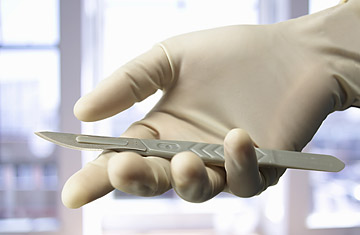
As an uninsured American, William Keval was dreading his hip-replacement surgery. Doctors in Illinois told him the procedure would cost up to $50,000 — a steep price tag for a 59-year-old farmer with two daughters. So rather than fork over a chunk of his savings, Keval opted to have the surgery done in Latvia, where he paid just $7,600. With the money he saved, Keval had excess skin and fat removed from his eyelids and underwent a face-lift and neck lift. "My nose is still broken, but it's turned back the clock a few years," he said on the phone from Riga, Latvia's capital, six days after surgery and one day after the stitches were removed from his eyelids. "Am I happy with the results? Absolutely. The doctor is a true artist."
With Latvia mired in recession and regular go-see-the-sights tourism in a slump, officials are hoping to persuade more foreigners to bypass popular nip-and-tuck destinations like Thailand and South Korea and turn to the Baltic nation instead. "More than 200 million people live within a two-hour flight of us, and all of them are potential customers," says Nils Usakovs, Riga's mayor.
To try to bring those future tummy tucks to Riga sooner rather than later, the city council appropriated nearly $1.8 million for tourism promotion in March. A considerable amount of that went to fund the Baltic Care Alliance, a group of eight Latvia-based medical companies, which just opened an office in London for consultations. And what's good for Latvia's plastic surgeons is good for the state coffers: 50% of plastic-surgery fees go back to the government in the form of taxes.
Latvia's rush to promote medical tourism is understandable. In the first three months of 2010, the country's unemployment rate climbed to 22.3%, a seven-year record and the highest level in the E.U. And on May 9, Statistics Latvia reported that the nation's gross domestic product contracted 6% year on year. The decline in global tourism has played a role in stymieing Latvia's recovery. According to the World Travel and Tourism Council, the contribution that tourism — which accounts for 1 in 20 jobs in Latvia — made to the country's GDP shrunk 22.4% last year, and the organization forecasts it will contract a further 12% this year. Increased tourism numbers would boost the faltering job market and provide some much needed foreign currency. As an added bonus, postsurgery recuperation means medical tourists stay in the country two to three times as long as recreational tourists — and spend that much more money.
Riga's doctors could use the work — the recession has decimated local demand for cosmetic work. "Two years ago, I was fully booked," says Dr. Janis Zarzeckis, one of Latvia's most esteemed surgeons and the founder of the Baltic Care Alliance. "Every week I did something like eight breast implantations for local people. Now I'm lucky if I have one or two nose jobs a week for locals." Zarzeckis says that as a result, highly skilled surgeons and doctors are moving from Latvia to Britain, Germany and Norway, which in turn leads to layoffs of nurses and medical staff.
The Baltic Care Alliance has the potential to turn Latvia into a new nip-and-tuck hub. On April 23, Zarzeckis met with six potential patients in London. By the end of the day, he had scheduled two nose jobs, one face-lift, two breast augmentations and a liposuction session for the month of May. And while it's the low prices that attract potential customers to Latvia — procedures are typically 30% to 40% cheaper than in the U.S. and Western Europe — Zarzeckis says it's the personalized care that convinces them Latvia's where they want to go under the knife. "In Latvia, if you do surgery on a patient, the patient becomes a relative," he says. "It's not a factory where you come in, get your eyes done and leave." Doctors frequently visit post-op patients at their spa or hotel, and hospital staff can arrange trips to the Riga Opera and sightseeing tours of the countryside, among other things.
Riga's officials are also hoping a boost in medical tourism can improve the city's reputation. In recent years, the availability of discount flights has made Riga a favored destination for rowdy bachelor parties. Many foreigners now see the city as a haven for voluptuous bar girls and cheap champagne, not as a cultural hub that straddles East and West. But Usakovs, the mayor, believes investment from surgery-seeking visitors can change that. "Medical tourism will enhance the prestige of Latvia and Riga," he says. By giving foreigners face-lifts, maybe Latvia will get one of its own.
— With reporting by Tara Kelly
